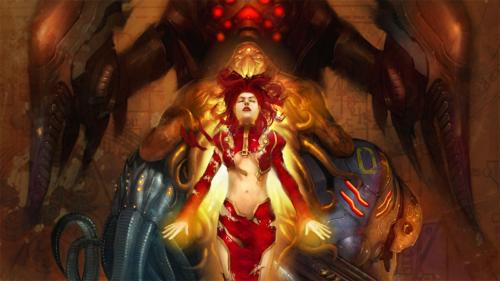Hey, you put chocolate in my peanut butter! You put peanut butter in my chocolate! BAAAWW!
Mongooge Publishing has finally released Cthulhutech. I put a custom order in for it at my favorite local gaming store just yesterday. It combines key concepts of the classic Cthulhu Mythos with stylistic and thematic elements of Japanese giant-robot science fiction shows like Gundam, Guyver, and Neon Genesis Evangelion. This has been a controversial move.
There are genres that have been around the block a few times, which have built for themselves a special place in the hearts of gamers. They’ve been with us for years, we’ve dabbled with them all, embraced some, rejected others, but everybody seems to have an opinion on them. Swords & Sorcery is the classic RPG genre, due to the Dungeons & Dragons foundation upon which dice-and-paper roleplaying is build on. Space Opera is another, bolstered by the popularity of entertainment standards like Star Wars, Star Trek, Battlesar Galactica, Babylon 5, and what-have you. Cyberpunk (dark near-future) science fiction really took roots with the R. Talsorian Cyberpunk and FASA’s Shadowrun, spinning off innumerable knock-offs. But where Swords & Sorcery draws its lineage to Tolkien, Space Operas look back to Star Blazers and thousand pulp novels, and Cyberpunk spawned from more recent works by the likes of William Gibson, one of my favorite genres germinated in the mind of Howard Phillips Lovecraft and several of his contemporaries.
I speak, of course, of the Cosmic Horror genre, most frequently associated with the Great Old One Cthulhu. Back in the early 1980s, Chaosium published a roleplaying game that drew heavily on the works of H.P. Lovecraft and those who were inspired by him. They put together a beastiary of unspeakable, indescribably-awful creatures alluded to in the source material, and hung together a cohesive cosmology of sorts. Thousands of gamers were exposed to Lovecraft for the first time through Chaosium’s classic work, and consider it an accurate representation of Lovecraft’s writings.
This isn’t really the case, though. Originally the stories of Cthulhu, Yog-Sothoth, Shub-Niggurath, and so forth were a loosely-woven web of stories by multiple authors. Robert E. Howard borrowed Lovecraft’s creations from time to time, and vice versa, but they weren’t necessarily related to each other in any kind of strict hierarchy. Regardless, many of the RPG enthusiasts out there have expressed various shades of anger at some of the sci-fi tropes that Mongoose has brought into their game, apparently provoked by the notion that the Cthulhu Mythos as they understand it is already complete, perfect, and immutable.
I’ve got my book on order, I’ll pay good money for it. I hope to post a review that will address some of the concerns that have come up:
- Mankind harnessing mythos magic is antithetical to the notion that such things are beyond the ken of the fragile human mind
- Doing battle with the great old ones or elder gods is utterly absurd
- Various dogma regarding the nature of the Mi-go
- The status of Deep Ones in relation to R’lyeh and the current disposition of Cthulhu Himself
- Whatever mechanics the game may have regarding the mental stability of player characters
